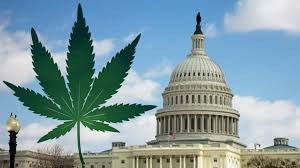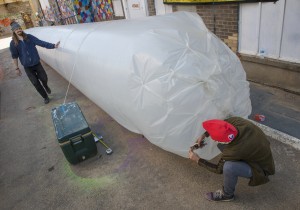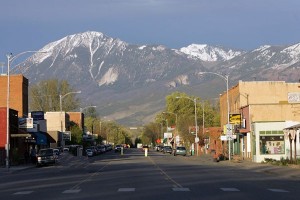Willie Nelson says he smoked a joint on the roof of the White House. Snoop Dogg claims he toked in a bathroom not far from the Oval Office.
 Protestors pushing for real legalization in Washington, D.C., didn’t get quite that far in April, but they did show up at 1600 Pennsylvania Avenue to spark up and make a point: It is taking far too long for the Obama administration to let the voters’ will take effect.
Protestors pushing for real legalization in Washington, D.C., didn’t get quite that far in April, but they did show up at 1600 Pennsylvania Avenue to spark up and make a point: It is taking far too long for the Obama administration to let the voters’ will take effect.
District voters legalized marijuana in 2014, and it’s safe to possess and use small amounts in the city. But nary a pot shop has opened, and protestors feel Obama is largely to blame.
The burn-out, scheduled for April 2, was put together as a way to make the city’s frustration clear. Participants planned to show up, light up, and get themselves arrested in front of the White House.
And they planned to come in style. In the days before the rally, artist Adam Eidinger was building a 51-foot inflatable joint to bring to the park across the street from the president’s residence. Eidinger hoped to put a fan inside it to blow cannabis smoke across the crowd. If that fails, he said, protesters could simply step inside the balloon, fill it with smoke, and seal it up.
Pressuring Obama and Congress to act
Eidinger is head of the D.C. Cannabis Campaign, and his goal is to pressure Obama and Congress into removing the final obstacles that make full legalization impossible in the District. Protesters also hope to take a subtle dig at D.C.’s lack of statehood.
In a broader sense, Eidinger said, he wants to make a point about the 5 million cannabis arrests that have occurred since Obama took office. And he wants the president to remove the drug from schedule 1 of the Controlled Substances Act – a list that includes dangerous drugs such as heroin and synthetic THC.
“Obama, he smokes, maybe not now, but he did smoke,” Eidinger said. “So for him to oversee an enforcement regime that has arrested 5 million people for marijuana . . . I’m very motivated because I think it’s a discriminatory practice.”
Eidinger, like many of the protesters, backs Vermont Sen. Bernie Sanders in the Democratic primaries. Sanders favors full legalization, while front-runner Hillary Clinton says the country needs more time. But if Clinton wins, as expected, action by Obama now could give her political cover to do the right thing, Eidinger said.
“If Obama really wants to help Hillary, he’ll do this,” Eidinger said. “Because people like me, who are strong Bernie supporters, we would feel more comfortable supporting the Democratic candidate if this is underway.”
Eidinger’s protest did not draw support from major marijuana lobbying groups

Eidinger’s protest drew plenty of attention, but not the support of national pro-pot lobbying groups.
“We’re not involved, and we don’t think that consuming marijuana on federal property is an appropriate way to promote reform,” said Kaitlyn Boecker, spokeswoman for the Drug Policy Alliance.
Tom Angell, head of the Marijuana Majority, agreed.
“Smoking marijuana outside the president’s house, around tourists and kids, is probably not a good way to get the president to do what you want,” Angell said.
—
Post a comment and let us know: Was it a smart idea to toke outside the White House? Could this sort of protest backfire and hurt the cause?
Toking in Front of the White House? It"s for a Cause
 Goldberg told Vanity Fair in March that
Goldberg told Vanity Fair in March that  “I started using the vape pen because I stopped smoking cigarettes about four years ago and discovered I couldn’t smoke a joint anymore,” she said. “The relief that I got with the vape pen was kind of different from what I got with smoking. I could control it much better.”
“I started using the vape pen because I stopped smoking cigarettes about four years ago and discovered I couldn’t smoke a joint anymore,” she said. “The relief that I got with the vape pen was kind of different from what I got with smoking. I could control it much better.” Currently,
Currently,  “What is and isn’t a schedule 1 narcotic is a job for Congress,” the president said in 2014. “It’s not something by ourselves that we start changing. No, there are laws undergirding those determinations.”
“What is and isn’t a schedule 1 narcotic is a job for Congress,” the president said in 2014. “It’s not something by ourselves that we start changing. No, there are laws undergirding those determinations.” Try telling that to Domonic Anthony Leuzzi, a teacher who allegedly looked the other way
Try telling that to Domonic Anthony Leuzzi, a teacher who allegedly looked the other way  Of course, students have been smoking marijuana in school
Of course, students have been smoking marijuana in school  Those fears are coming to the surface again, as Washington, Oregon, and Colorado prepare to
Those fears are coming to the surface again, as Washington, Oregon, and Colorado prepare to  The rule change won’t allow outside investors to hold an actual ownership stake in cannabis businesses. But the state Legislature could change that, too, as a bill currently before lawmakers would allow non-residents to own up to 49 percent of these companies.
The rule change won’t allow outside investors to hold an actual ownership stake in cannabis businesses. But the state Legislature could change that, too, as a bill currently before lawmakers would allow non-residents to own up to 49 percent of these companies.
 The many votes to ban retail stores sprang mostly from anxiety, fear, and misunderstanding. Local leaders worried legalization would bring crime, tank property values, damage community reputations, and encourage drug use by minors. Many of the laws were temporary moratoriums, but they signaled a desire to keep weed out, possibly forever.
The many votes to ban retail stores sprang mostly from anxiety, fear, and misunderstanding. Local leaders worried legalization would bring crime, tank property values, damage community reputations, and encourage drug use by minors. Many of the laws were temporary moratoriums, but they signaled a desire to keep weed out, possibly forever. The answer, naturally, is complicated. But as a general matter, shipping cannabis from one place to another – whether across the country or between cities – takes many forms. If there is a way to move something from one place to the next, it has been used to transport pot.
The answer, naturally, is complicated. But as a general matter, shipping cannabis from one place to another – whether across the country or between cities – takes many forms. If there is a way to move something from one place to the next, it has been used to transport pot. Mail may seem risky, but shipping pot by airplane actually is risky. It’s not uncommon for dealers to fly to Colorado or Washington, buy some legal marijuana, and fly it home to sell on the street.
Mail may seem risky, but shipping pot by airplane actually is risky. It’s not uncommon for dealers to fly to Colorado or Washington, buy some legal marijuana, and fly it home to sell on the street. Nicholas Cunningham,
Nicholas Cunningham,  Cunningham sold pot without any kind of vendor’s license, Barker said, and he sold it to anyone who could pay, with no security measures to keep it out of the hands of children.
Cunningham sold pot without any kind of vendor’s license, Barker said, and he sold it to anyone who could pay, with no security measures to keep it out of the hands of children. The decision, issued in March by a 6-2 vote, is
The decision, issued in March by a 6-2 vote, is  The suit didn’t seek to end all legalization in the Rocky Mountain State;
The suit didn’t seek to end all legalization in the Rocky Mountain State;